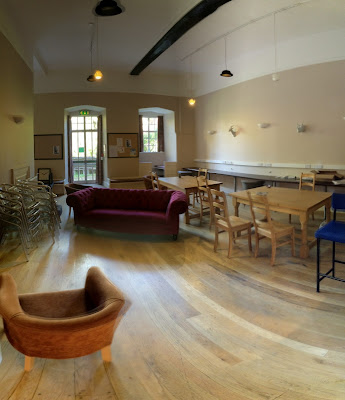Sunny, 72 degrees F
10:30 - Toured Christ Church with Junior Commons Room (JCR) President Tosin Oyetunji. Four MSU students have been assigned to Christ Church and will be joining fellow MSU student Ben Bailey who has been studying in Oxford since January.
Christ Church encompasses both the college of that name and the Anglican cathedral contained within the college grounds. This is a fairly unique arrangement and grants Christ Church several distinguishing characteristics. For example, Christ Church has both a Cathedral Choir and a College Choir, both quite famous.
 |
| Tom Tower and Mercury Fountain at Christ Church |
 |
| View of Dining Hall from Tom Quad |
 |
| Interior of Dining Hall |
Christ Church occupies the site of the former St. Frideswide's Monastery which was suppressed by Cardinal Wolsey when he established his Cardinal's College in 1524. Henry VIII acquired the college after Wosley's downfall and reestablished it as Christ Church in 1546. Since then, the college has grown to its present size of approximately 700 students (including graduate students). The college has one of the highest reputations within the University with numerous former students going on to achieve great fame and success. Some of these include the philosopher John Locke, religious leaders such as John Wesley and William Penn, and the writers W.H. Auden and Lewis Carroll.
(For an official History of Christ Church, click here.)
Our tour included the famous Tom Quad (named for Tom Tower, the famous bell tower which dominates the college's main entrance), Peckwater Quad, the college library, the Masters' Garden, and the Christ Church Meadow (a large area of pasture land leading down to the River Thames and the various college boathouses). We also visited the dining hall (the famous Hogwarts Great Hall from Harry Potter) and stopped by Tosin's room to have a look at some actual student lodgings. (High ceilings, wood paneling, and internet access. What more do you need?)
 |
| (l to r): Khanh and Ben with JCR President Tosin Oyetunji in front of his residence hall. |
 |
| Interior 1 of the Christ Church JCR |
 |
| Interior 2 of the Christ Church JCR |
12:00 - Ate a quick lunch at G&D's, a local sandwich and ice cream chain with a location across the street from Christ Church. Ordered a turkey and Swiss bagel, water (which was somehow misheard as "large latte"), and Bailey's ice cream for "afters" (see notes on lecture below).
 |
| G&D's near Christ Church |
12:45 - Returned to WISC office for another lecture by Professor Schüttinger, this time on the subject of Anti-Americanism. The U.K. has been a source of anti-Americanism since British colonists landed at Jamestown in 1607, but nowadays, anti-Americanism is not something commonly encountered in Oxford, not seriously anyway. However, given the course of U.S.-U.K. relations over the past decade and the strain placed on the "special relationship" by two wars, it is a topic worth discussing.
The majority of the speech focused on the peculiarities of British culture. Brits are generally more reserved, something Prof. Schüttinger attributes to the smallness of the British isles and the subsequent lack of space and privacy. There is a noticeable absence of front porches, something common in the American South but altogether foreign here. A Brit may have a rear garden but almost never a porch. The neighbors won't know you're home. Also, due to the tumultuous history of the continent, Prof. Schüttinger believes that Europeans in general possess a "tragic sense of life" compared to the American sense of life's "unlimited possibility." Europeans tend to be more dependent on one another while Americans are stereotypically independent. Finally and perhaps most importantly, the British class system deserves mention. Class in Britain is loosely associated with birth and education whereas in the U.S. it is based more on money. As a result, one's class-status in the U.K. is more difficult to change in one's lifetime. One can earn money, but that won't raise one's class. In Prof. Schüttinger's opinion, the system is typified by the British use of four different words for "desert" depending on one's class: "pudding" for the upper class, "sweet" for the upper-middle class, "dessert" for the lower-middle class, and "afters" for the working class. One can judge a restaurant by its word choice, though some cheat and upgrade their status by using a classier-sounding term. "That's a Killer Fact, you see."
 |
| Norrington Room at Blackwell's. |
No comments:
Post a Comment